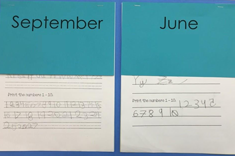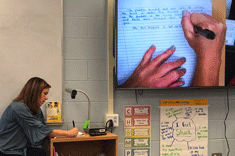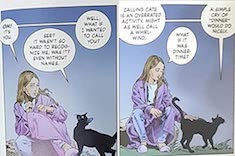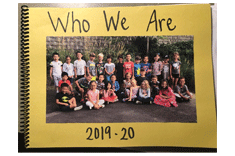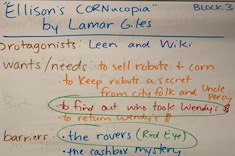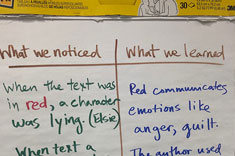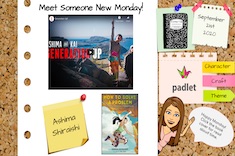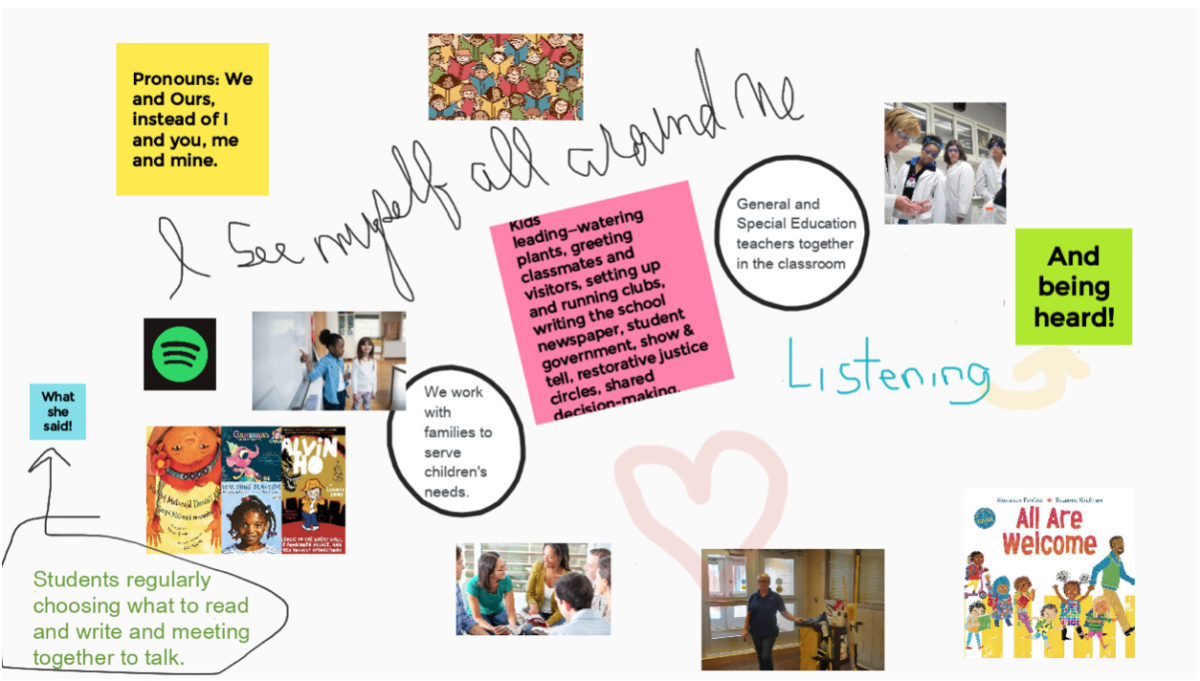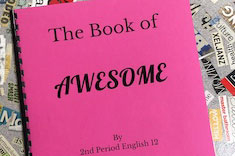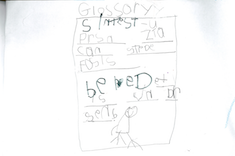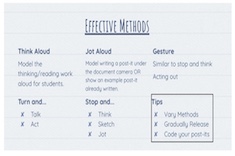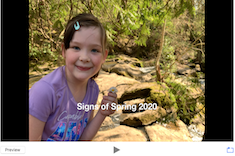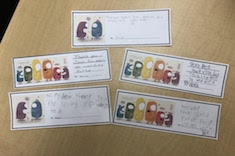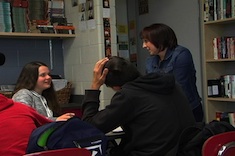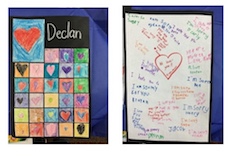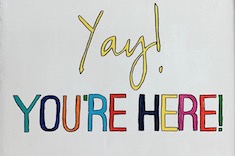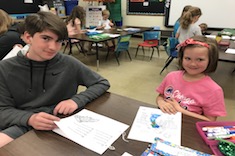Community Building
It's one of the big paradoxes of literacy instruction - students best learn how to read and write independently when they have a strong community of support in classrooms. How teachers build those thoughtful, kind, and challenging classroom communities is explained in these resources.
Latest Content
A Complete Circle: Identity, Growth, and Community
Bitsy Parks offers key end-of-the year activities that allow students to reflect and notice their identities, growth, and community as readers and writers.
Words of Wisdom and Passing the Torch
Melanie Quinn shares a fun activity to help current students share advice for next year’s class.
COVID Silver Linings: Positive Changes in Teaching Practices
Dana Murphy outlines the teaching practices that she learned from remote teaching and plans to carry with her upon returning to a physical classroom.
A Minimalist Classroom
Mandy Robek adjusts her mindset of preparing her classroom according to COVID guidelines and discovers an open heart and mind as she prepares a “minimalist classroom.”
Best Graphic Novel Adaptations for the Middle Grades
Shari Frost shares her favorite graphic novel adaptations for the middle grades.
Class Books Build Readers, Writers, and Community
Bitsy Parks shares the ways in which class books help students work as readers and writers, as well as build a community.
Teaching Summary
Christy Rush-Levine faces the challenge of helping her students see summary writing not as drudgery, but as a way to build more sophisticated thinking around texts.
One Text. One Conversation. Many Possibilities.
Matt Renwick explores ways in which whole-class conversations around one text can build a strong community as understanding is co-constructed.
Online Routines to Create Energetic Reading Communities
Melissa Quimby shares online routines to strengthen the class reading community.
Belonging in a School Community
Suzy Kaback thinks deeply about the concept of belonging as an essential part of building a school community.
Honoring Student Identity
Christy Rush-Levine considers how to communicate to all students that their presence and their identities are valued and appreciated.
A Student Book of Awesome
Gretchen Schroeder’s high school students build community by creating a shared text of things they love.
Building Writer Relationships with Author Studies
Matt Renwick shares creative ways teachers in his school celebrate authors.
Engaging Students with Humor
Mark Levine finds humor is the “secret sauce” in engaging middle school students and including introverts in the classroom community.
Digital Interactive Read Alouds
Tara Barnett and Kate Mills share everything from useful prompts to the best tech tools for moving interactive read alouds to digital platforms during remote instruction.
Issues Overload
Shari Frost finds that the issues students may be dealing with in some children’s books can be overwhelming. She shares some of her favorite books for grappling with one troubling topic at a time.
Choice in Literacy Workshops
What makes choice authentic in literacy workshops? Christy Rush-Levine grapples with this tough question that leads to changes in her instruction.
Using Photographs in Remote Learning Communities
Bitsy Parks shares how she and her first-grade students used photography to bridge the distance between home and school this spring, learning lessons she is using this fall in remote learning contexts.
Three Things Digital Tools Have Taught Me About Feedback
Christy Rush-Levine discovers that a move to digital feedback reveals many important truths about her middle school students, including insights into the effect of grades on how learners view response to their work.
Sustaining (Not Just Building) Community Online
Fact or Fiction?
Suzy Kaback works with students to create a “fact or fiction” class book to explore the boundaries between truth and fantasy.
Routines for Building Gratitude
Bitsy Parks finds even the dreariest days in her first-grade classroom are infinitely more enjoyable because she’s built in routines for expressing gratitude.
Management and Middle School Workshops
Christy Rush-Levine lowers the tension level in her class over management issues by moving from irritation to curiosity, using her “inner chimpanzee” voice.
Call Me by My Name
Suzy Kaback reminds us that the language we use to talk about challenging students shapes our perceptions of them. That’s why she has moved to calling students “small teachers.”
Everyday Celebrations and Traditions
Bitsy Parks shares how she builds a learning community with displays and traditions that celebrate families.
Making Our Writing Public
Jennifer Allen shares a project student writers complete with support from a local college to make writing public and widen the net for feedback.
Letting Go in the Remote Learning World
Jen Schwanke, like many of us, is scrambling to deal with issues cropping up in the new world we all face of remote instruction. She shares some of the most common problems, and how teachers might deal with them.
Don’t Force Vulnerability
Ruth Ayres eavesdrops on some moms complaining about homework assignments, and finds the experience leads to reflection on the dangers of forcing students to make themselves vulnerable in classrooms.
Creating a Safe Space in Middle School
Christy Rush-Levine ponders what it means to create a safe space for all of her middle school students, and then makes some changes.
Kindergarten and Middle School Poetry Partnership
Middle schoolers and kindergartners forge friendships at Katherine Sokolowski’s school through a sweet poetry writing and sharing project.
Browse Content By
Type
Category
- Assessment Tools
- Big Fresh Archives
- Booklists
- Choice Numeracy
- Classroom Design
- Common Core
- Community Building
- Conferring
- Content Literacy
- Digital Literacy
- English Language Learners
- Equity
- Family Relations
- Free Samples
- Guiding Groups
- Leadership
- Literacy Coaches
- Mentor Texts
- Minilessons
- New Teacher Mentors
- Podcasts
- Poetry
- Quote Collections
- Reading Strategies
- Self Care
- Struggling and Striving Learners
- Talking and Listening
- Teacher Study Groups
- Teaching Reading
- Teaching Writing
- Word Study and Vocabulary
Author
- Melissa Quimby
- Nawal Qarooni
- Gwen Blumberg
- Julie Cox
- The Lead Learners
- Hannah Tills
- Josie Stewart
- Ruth Metcalfe
- Mallory Messenger
- Becca Burk
- Jodie Bailey
- Vivian Chen
- Mary Brower
- Tiffany Abbott Fuller
- Stephanie Affinito
- Ruth Ayres
- Leigh Anne Eck
- Heather Fisher
- Shari Frost
- Julie Johnson
- Suzy Kaback
- Gigi McAllister
- Shirl McPhillips
- Melanie Meehan
- Cathy Mere
- Debbie Miller
- Tara Barnett and Kate Mills
- Tammy Mulligan
- Dana Murphy
- Bitsy Parks
- David Pittman
- Brenda Power
- Heather Rader
- Matt Renwick
- Mandy Robek
- Christy Rush-Levine
- Gretchen Schroeder
- Jen Schwanke
- Brian Sepe
- Katherine Sokolowski
- Stella Villalba
- Jennifer Vincent
Grade Level
Choice Literacy Membership
Articles
Get full access to all Choice Literacy article content
Videos
Get full access to all Choice Literacy video content
Courses
Access Choice Literacy course curriculum and training

